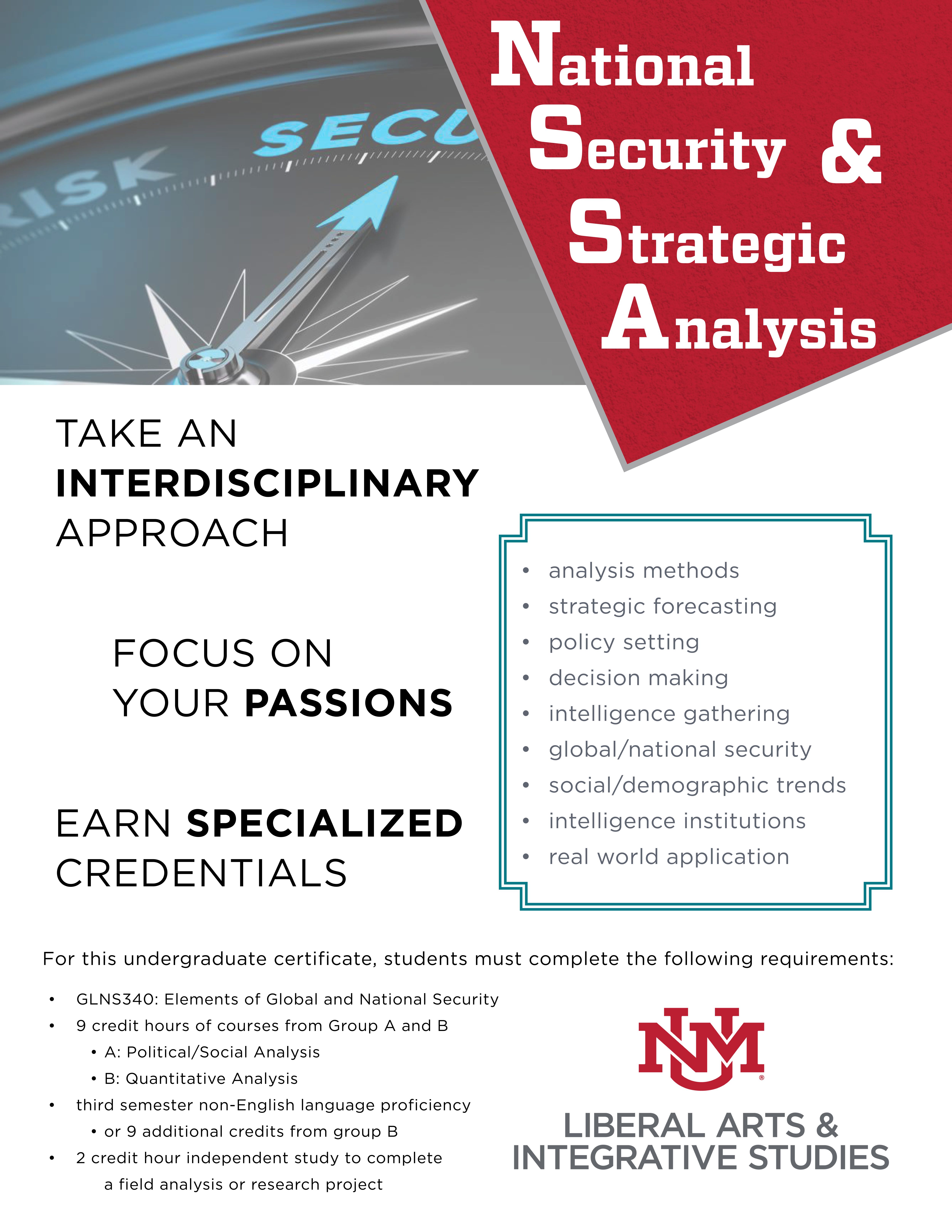National Security & Strategic Analysis
Undergraduate Certificate
The undergraduate certificate in National Security and Strategic Analysis (NSSA) is an interdisciplinary certificate designed to prepare students for careers in national security within the U.S. Intelligence Community (IC) and other governmental agencies, national and international business companies, policy think tanks and non-governmental organizations (NGO)s worldwide. The primary focus is on learning analysis methods used by governmental and NGOs for strategic planning, policy setting, and decision making. This interdisciplinary effort integrates techniques and methodology of information collection and data and policy analysis with diverse knowledge.
The process uses knowledge such as national and international political movements, social and demographic trends, climate and environmental stresses, technology and policy for weapons of mass destruction (WMD), and nonproliferation issues.
NSSA students will gain expertise in their major area and apply it to develop:
• knowledge about intelligence and strategic analysis institutions
• skills in analysis methods and strategic forecasting
• writing and briefing skills related to national security issues
• knowledge about intelligence policy and technical areas relating to national security
• an ability to apply advanced analysis to national security policy, science, and engineering
The Undergraduate Certificate program is open to undergraduate students who are interested in national security and strategic analysis. Undergraduate NSSA certificates may be earned by successful completion of a prescribed program of study for students also earning an undergraduate degree at UNM. There is a post baccalaureate option for recent graduates. The certificate is designed to provide specific knowledge and competencies to complement and extend the student's undergraduate degree and to provide exposure to a range of topics in the interdisciplinary field of national security and strategic analysis. The capstone is a demonstration of competency by the student through a coherent and critical analysis activity and an academic paper based on their individual educational path and diverse range of classes

Full Requirements
To earn the undergraduate certificate in National Security and Strategic Analysis, the student must:
- Complete or have completed a baccalaureate degree.
- Complete a 3 credit hour course, GLNS 340 - Elements of Global and National Security (formerly LAIS 340). This course describes federal agencies offering strategic and national security analysis to the government, and studies their analytic methods and resulting products. A discussion of multifaceted strategic analysis and the attending influences of a variety of non-governmental organizations (NGOs) involved in national security is a key component of the course. This includes, but is not limited to, think tanks, business analysis groups, and NGOs created specifically to further policies advantageous to selected nations. Included is a study of representative analytic products and methods, including trend projections and forecasting employed by the organizations.
- Take 9 credit hours of classes in Group A (Political/Social Analysis), and Group B (Quantitative Analysis), with at least 3 credit hours from each group. See additional discussion below under Courses in Group A and B.
- Complete a field analysis or research analysis project related to national security, strategic analysis or intelligence analysis as at least a 2 credit hour independent study course. Complete either an analysis paper-based on work in an approved internship, or an analysis paper-based on an independent and faculty-directed research project as part of this requirement.
- Take at least 3 semesters of a foreign language or demonstrate equivalent competency in a foreign language; or three additional courses in group B.
Courses in Group A and B
Courses are not offered each year and some courses are topics or seminar courses. For topics and seminar courses, approval of specific topic is required by the NSSA Faculty Committee. Other courses can substitute for these courses upon approval of the student's program by the NSSA Faculty Committee. To encourage a multidisciplinary approach, at most 3 credit hours per department are allowed in each of Group A and B. Only one course can be taken at the 100- or 200-level. Many courses require one or more prerequisites which may or may not count towards the certificate, thus effectively increasing the credit hours needed to earn the certificate. Students are also encouraged to suggest additional courses to substitute for those in Groups A and B. The decision to approve a substitution is made within two weeks by the NSSA Faculty Committee.
Group A & B courses may be found here
_______________________________________________________________________________
Additional information about certificate programs:
- The University of New Mexico offers over a dozen undergraduate certificate programs, including NSSA
- A certificate is a postsecondary credential that shows a student has completed practical training and gained experience and a specific skill set in a certain field. – U.S. News
- When hiring for a position, many employers look for candidates who have received a certain amount of training or education in that career field. You can receive this type of training by completing a certificate or degree program. – indeed Career Guide
- Certificates provide “evidence to potential employers that the individual has a quantifiable understanding of their field of work” – indeed Career Guide
- Adding a professional certificate could make up for a lack of real-life experience – Recruiter.com

